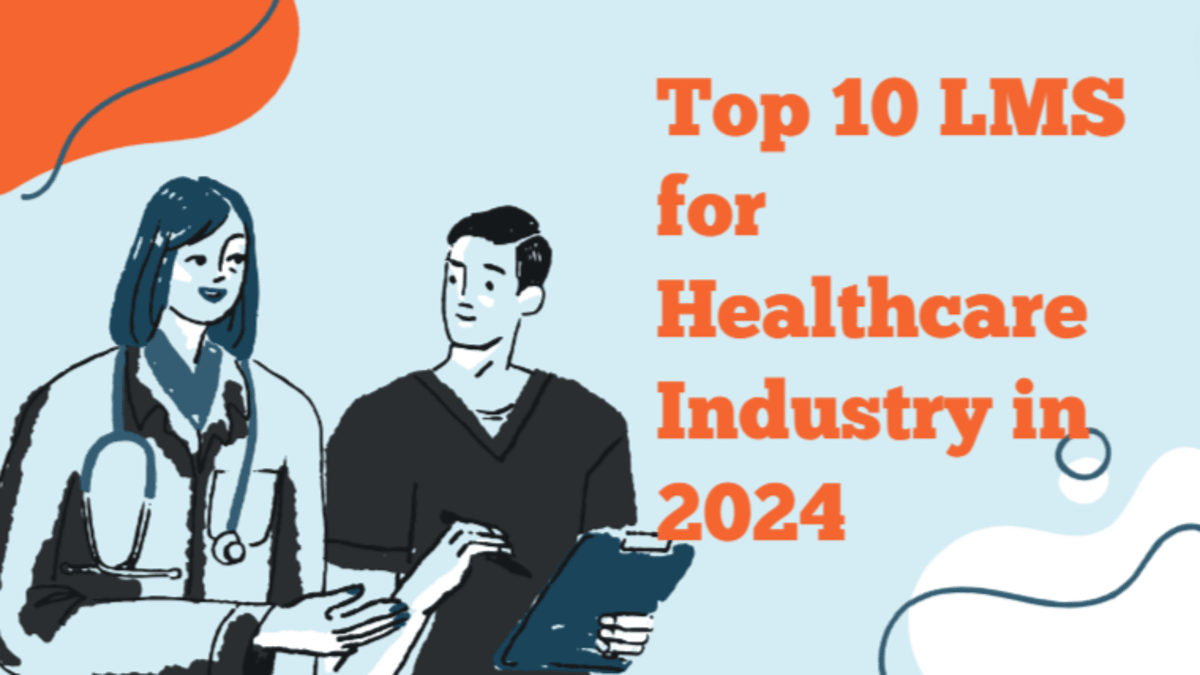In 2024, Learning Management Systems (LMS) continue to play an important role in the healthcare industry. They provide a structured platform for training, compliance, and continuous education, ensuring healthcare professionals stay updated with the latest practices and standards. Here are the top 10 LMS software lists with their key features and pricing details that are making waves in the healthcare industry in 2024.
What is HealthCare LMS Software?
A healthcare LMS is software made for the healthcare field to run online training and education. It helps healthcare places make, share, and follow classes for doctors, staff, and managers. Healthcare LMS systems usually have tools for training on rules, medical skills, ongoing education for doctors, getting certifications, and seeing how well people work. They’re designed to fit what healthcare places need, following laws, and making sure patients get the best care by training people well and keeping up with changes in healthcare.
How LMS Software works in Healthcare Industry
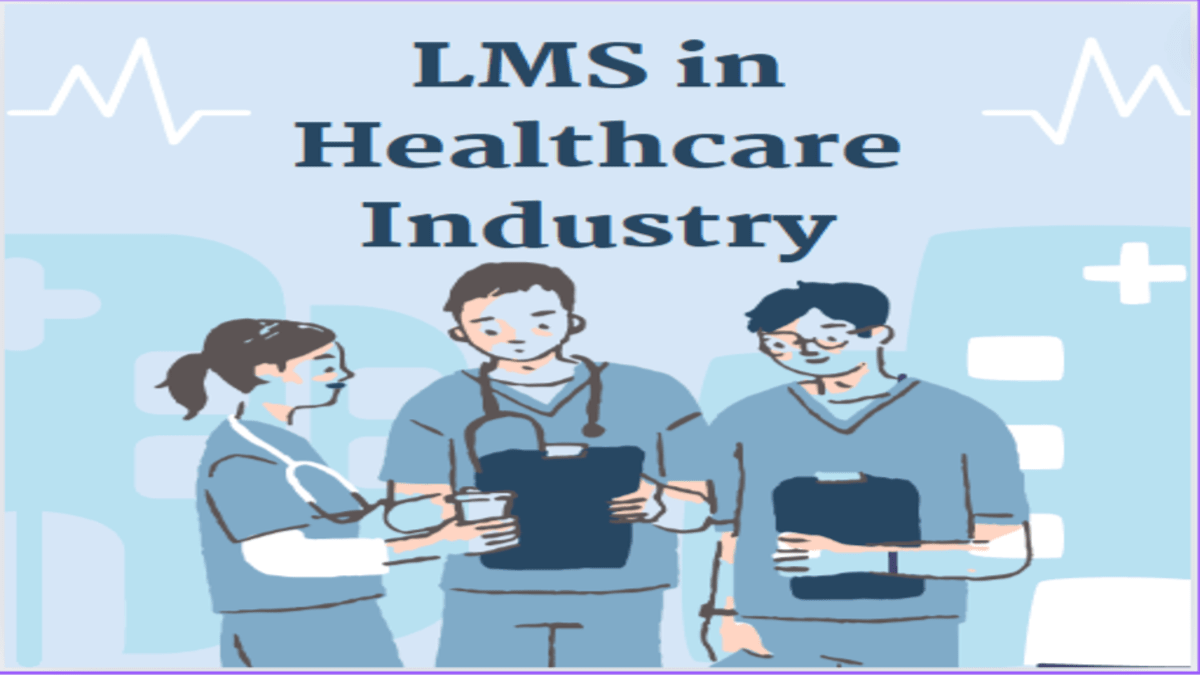
LMS Software in the healthcare industry helps streamline the training process, ensure compliance, and improve the overall quality of care by providing accessible, trackable, and engaging educational resources. Here’s how it operates:
- Course Creation and Management
Healthcare institutions can create and manage custom courses on topics like compliance training and advanced medical procedures, easily updating them as needed.
Example: A hospital might create a course on the latest COVID-19 protocols, ensuring all staff are up-to-date. - Delivery of Training Materials
LMS platforms deliver training in formats like videos, presentations, and interactive modules, catering to different learning styles.
Example: A clinic can provide video demonstrations of new surgical techniques for their surgeons to study. - Tracking and Reporting
LMS software tracks learner progress, giving detailed performance reports to ensure compliance and highlight areas needing more training.
Example: An administrator can track which nurses have completed mandatory patient safety training and follow up with those who haven’t. - Certification and Compliance
LMS software helps healthcare professionals meet regulations by automating the certification process.
Example: A healthcare facility can use an LMS to ensure all employees have current certifications for CPR and other life-saving techniques. - Accessibility and Flexibility
Healthcare professionals can access training anytime, anywhere, fitting learning into their busy schedules.
Example: A doctor can complete required continuing education credits online during their free time, rather than attending in-person seminars. - Interactive Learning
Interactive elements such as quizzes, discussion boards, and simulations can enhance learning and retention. These tools help create a more engaging and effective training experience.
Example: A pharmacy can use interactive case studies to teach pharmacists about new medication protocols. - Collaboration and Communication
Example: Medical staff can participate in discussion forums to share best practices and solutions to common challenges.
Benefits of using LMS Software in Healthcare Industry
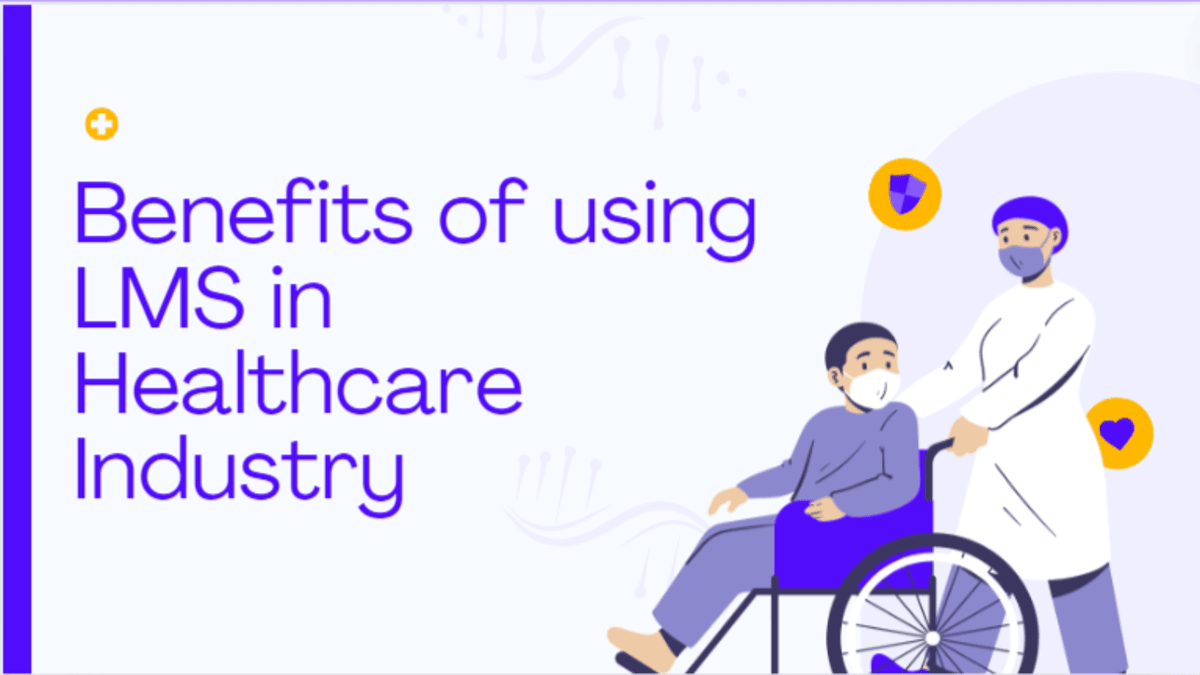
- Improved Patient Care: Enhances the knowledge and skills of healthcare providers, leading to better patient outcomes.
- Cost-effective: Reduces expenses such as travel and accommodation for in-person training.
- Scalability: Handles many learners and scales as needed by the organization.
- Trackable Progress: Monitors and tracks employee progress, helping organizations identify skill gaps and tailor training accordingly.
- Accessibility: Provides 24/7 access to training materials, allowing healthcare professionals to learn at their own pace and convenience.
Popular LMS Software List for Healthcare Industry
Here we provide some popular LMS software list for the healthcare Industry
1. Docebo
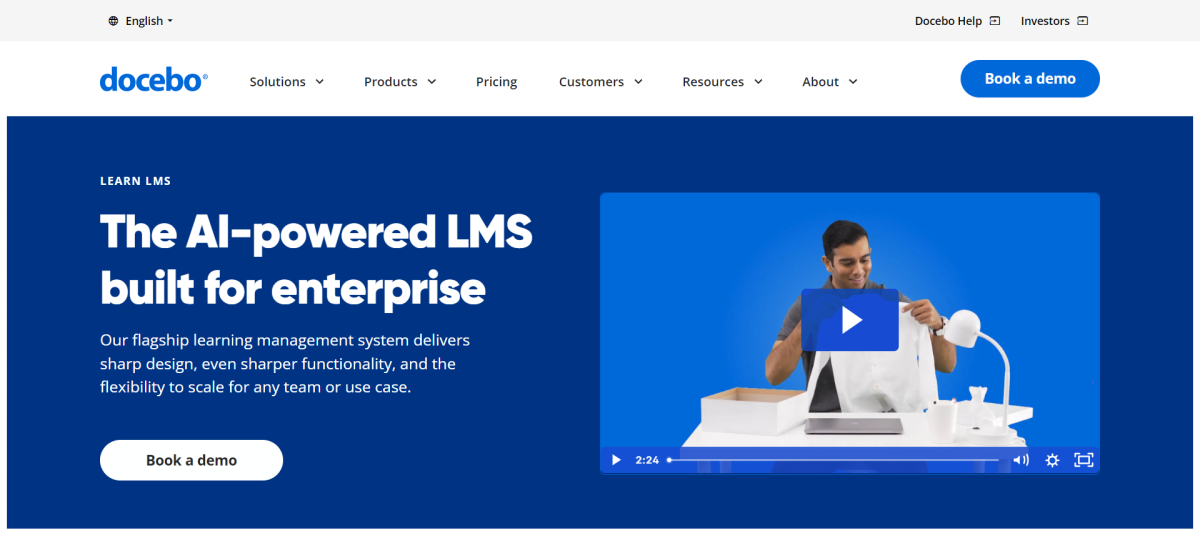
Docebo Lms is a cloud-based system designed to make corporate training and learning easy. It helps create courses, manage content, engage learners, assess their progress, and generate reports. Docebo is known for its user-friendly interface, mobile compatibility, and integration capabilities with various business systems. It supports blended learning approaches and provides analytics to track learner progress and training effectiveness. Docebo aims to optimize employee development and organizational learning through a scalable and customizable platform.
Key Features
- AI-Powered Learning: Personalized learning experiences driven by artificial intelligence.
- Content Management: Easy integration with various content providers.
- Compliance Tracking: Ensures healthcare professionals meet regulatory requirements.
Pricing Details:
Docebo: See Docebo Pricing Details(Custom Pricing)
Example
A hospital uses Docebo to deliver mandatory compliance training to all staff, tracking completion rates and ensuring certifications are up-to-date.
2. HealthStream
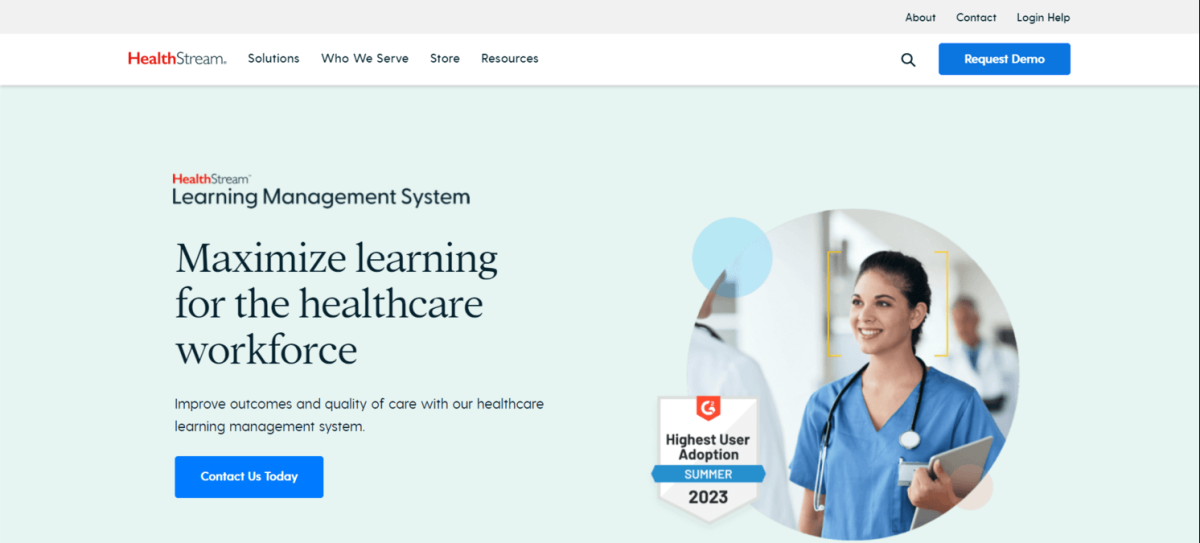
HealthStream LMS (Learning Management System) software is designed specifically for the healthcare industry to manage training and education programs online. It helps healthcare organizations deliver and track compliance training, clinical education, and professional development courses for their staff. HealthStream LMS includes features such as course creation, content management, competency tracking, and reporting tools tailored to meet regulatory requirements and enhance patient care outcomes. It aims to improve staff proficiency, maintain regulatory compliance, and support continuous learning within healthcare settings.
Key Features
- Healthcare-Specific Content: Extensive library of healthcare-related courses.
- Performance Management: Tools to assess and enhance staff performance.
- Regulatory Compliance: Keeps track of industry regulations and compliance requirements.
Pricing Details:
Healthstream Lms: Custom Pricing
Example
A clinic employs HealthStream to onboard new employees, ensuring they complete required training modules on patient privacy and safety.
3. TalentLMS
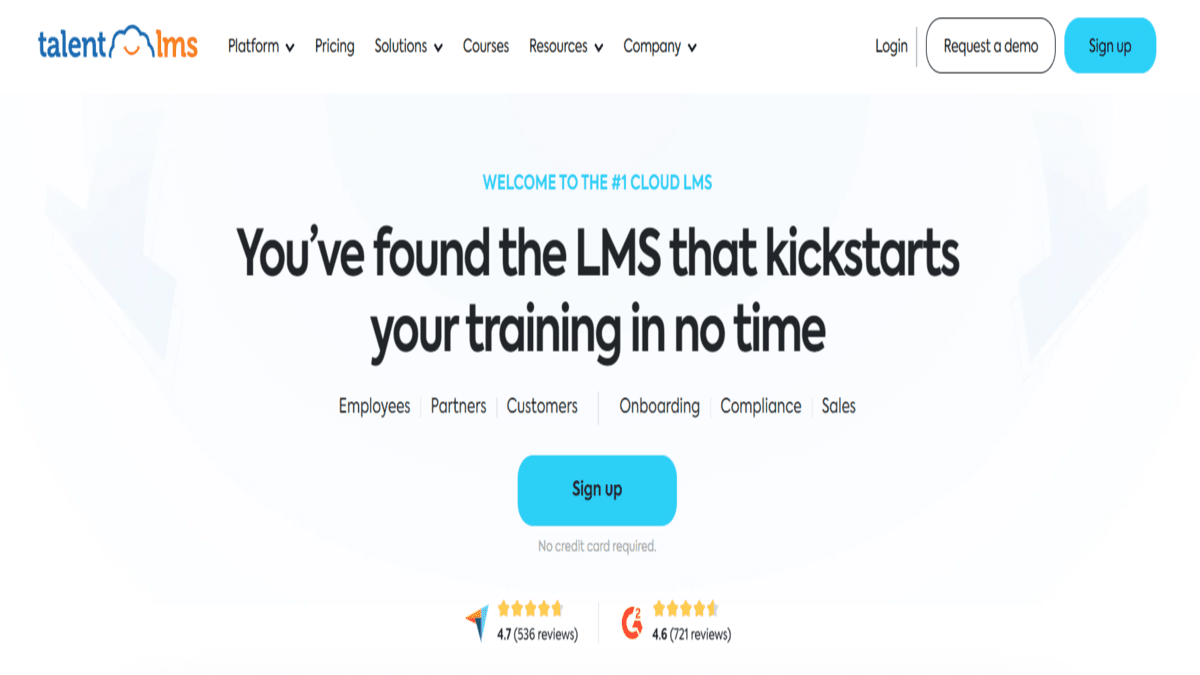
TalentLMS is an online training system stored in the cloud, built to make learning easier for any business. It helps organizations create, handle, and provide training courses to employees, customers, and partners. TalentLMS lets you make and adjust courses, use tools to check how learners are doing, track progress, manage certifications, and connect with other business tools. Its goal is to simplify learning, making it more effective with easy-to-use screens and many ways to learn.
Key Features
- Customizable Courses: Create and modify courses to fit specific training needs.
- Mobile Learning: Access training materials anytime, anywhere.
- Reporting and Analytics: Provides detailed reports to monitor learning progress and outcomes.
Pricing Details:
TalentLMS: See TalentLMS Pricing Details
Example
A healthcare network uses TalentLMS to provide ongoing education to nurses, allowing them to complete courses on their mobile devices during downtime.
4. Absorb LMS
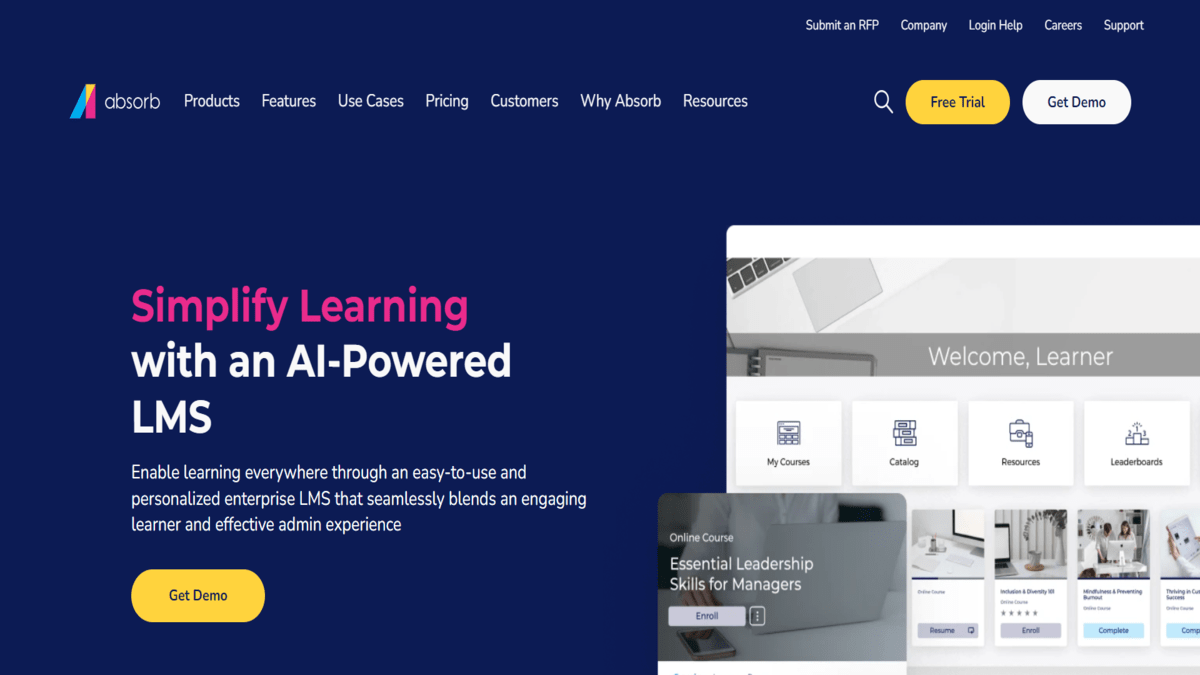
Absorb LMS is a tool built for companies to train their teams and learners online. It lets organizations develop, distribute, and oversee training courses for employees and others. With Absorb LMS, you can create courses, design personalized learning routes, conduct assessments and quizzes, monitor progress, manage certifications, and link it with other business tools. Its aim is to boost learning quality and efficiency with an easy-to-use interface and strong management features designed specifically for corporate training.
Key Features
- Intuitive Interface: Easy-to-use interface that simplifies the learning process.
- Scalability: Supports large organizations with thousands of users.
- Automated Administration: Reduces the administrative burden with automation tools.
Pricing Details:
Absorb LMS: See Absorb LMS Pricing Details
Example
A large hospital network utilizes Absorb LMS to deliver continuing education courses to physicians, ensuring they stay current with medical advancements.
5. Cornerstone OnDemand
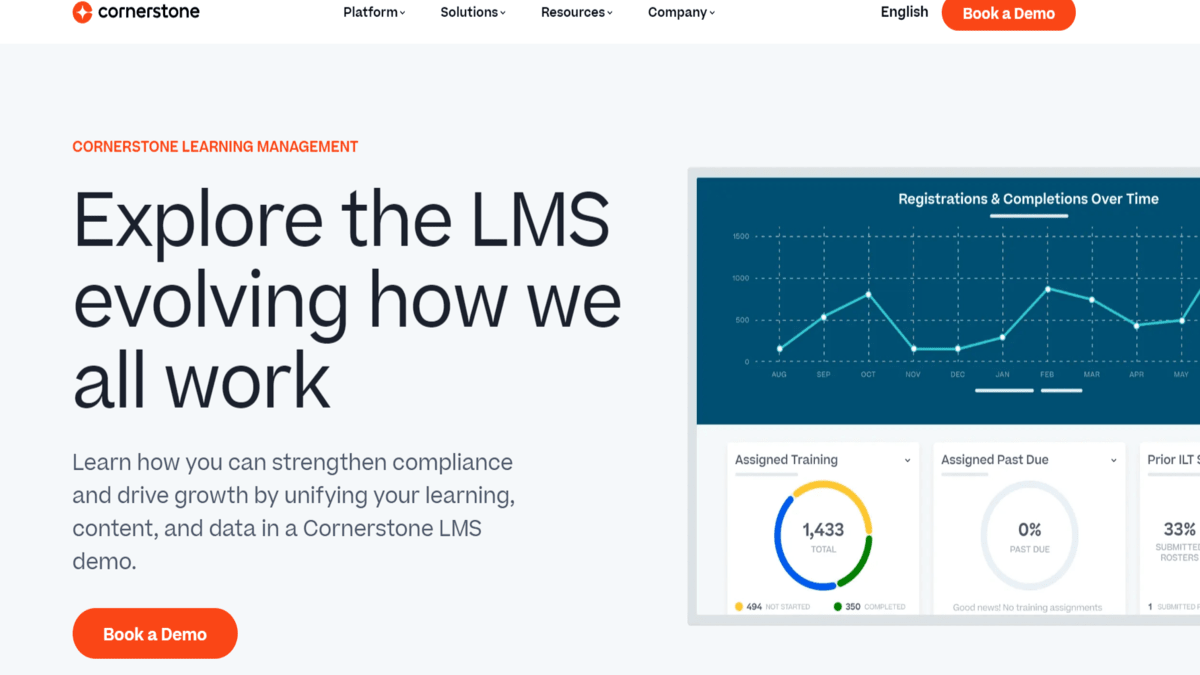
Cornerstone OnDemand LMS is a cloud-based system designed to help businesses manage their workforce training and development programs. It offers features for course creation, delivery, and management, as well as tools for performance management, employee onboarding, compliance training, and career development. Cornerstone OnDemand LMS aims to enhance employee skills, improve organizational performance, and support talent management initiatives through customizable and scalable learning solutions. It is widely used across various industries, including healthcare, to streamline training processes and foster continuous learning and development.
Key Features
- Extensive Course Library: Provides access to a diverse array of healthcare training materials.
- Compliance Management: Ensures compliance with healthcare regulations.
- Performance Tracking: Monitors and evaluates employee performance.
Pricing Details:
Cornerstone OnDemand: https://www.cornerstoneondemand.com/platform/learning-management-lms/ (Custom Pricing)
Example
A healthcare provider uses Cornerstone OnDemand to train administrative staff on new healthcare management software, ensuring a smooth transition and operational efficiency.
6. Moodle
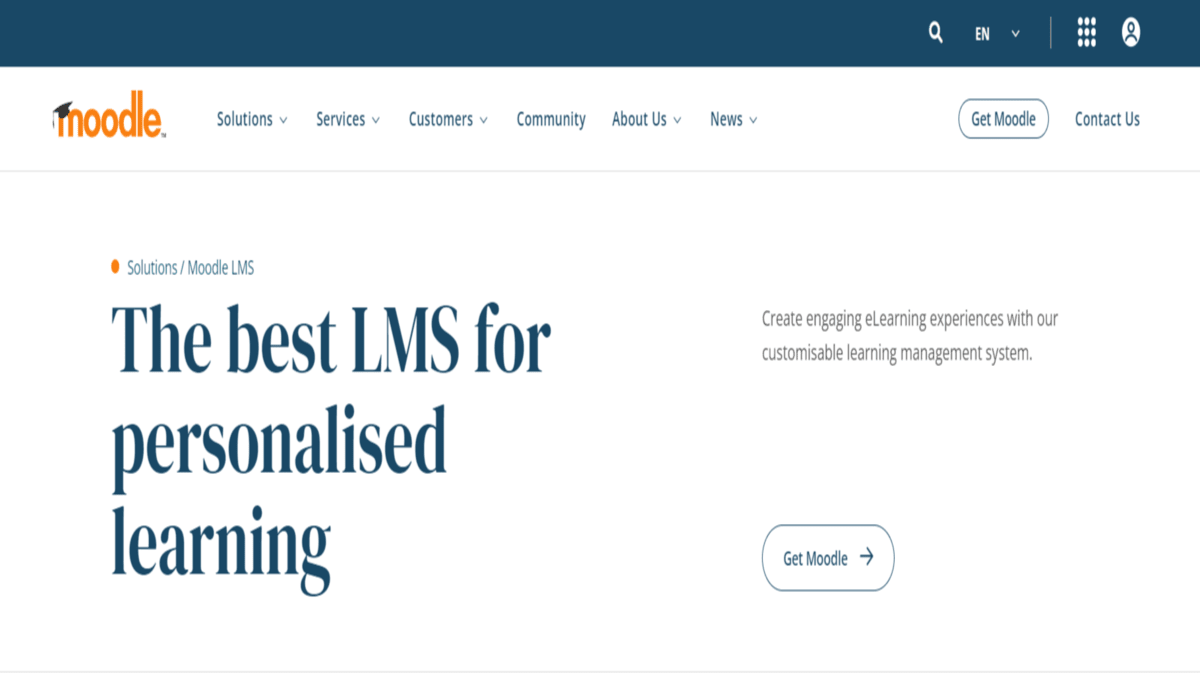
Moodle LMS is a free learning management system (LMS) that helps teachers create and run online courses. It offers tools for managing courses, working together, testing, and communication between teachers and students. Moodle can be customized with plugins and themes to fit what each school or organization needs. It’s popular in schools and colleges for both regular classroom learning and fully online classes. Moodle is all about being flexible, interactive, and driven by its user community.
Key Features
- Customizable Platform: Adaptable to meet specific training requirements.
- Community Support: Large community for support and resources.
- Cost-Effective: Eliminates licensing fees, making it a cost-effective choice.
Pricing Details:
Moodle LMS: See Moodle Pricing Details(Custom pricing)
Example
A medical school uses Moodle to deliver online courses to students, providing them with access to learning materials and assessments.
7. Litmos
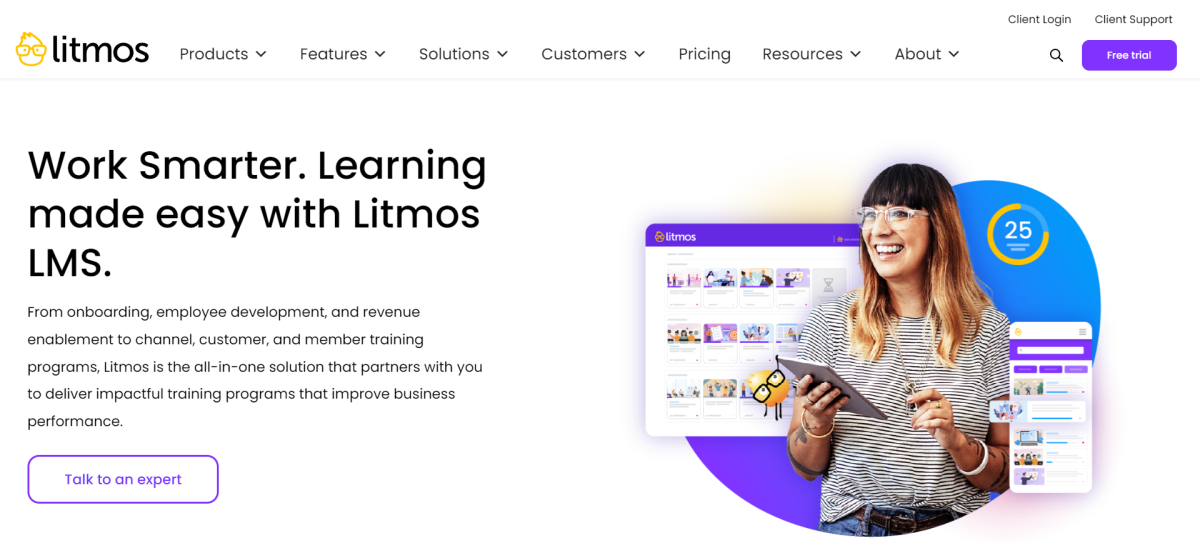
Litmos LMS is a cloud-based learning management system designed to deliver and manage online training programs for businesses. It provides tools for course creation, learning delivery, assessment, and reporting. Litmos is known for its ease of use, mobile compatibility, and integration capabilities with other business systems. It supports various learning formats and aims to enhance employee training efficiency and effectiveness through interactive and accessible learning experiences.
Key Features
- Compliance Training: Ensures adherence to healthcare regulations.
- Mobile Access: Training materials accessible on any device.
- Advanced Reporting: Detailed insights into learning progress and outcomes.
Pricing Details:
Litmos: See Litmos Pricing Details (Custom Pricing)
Example
A pharmaceutical company uses Litmos to train sales representatives on new product launches and compliance requirements, ensuring they are well-prepared for customer interactions.
8. Tovuti LMS
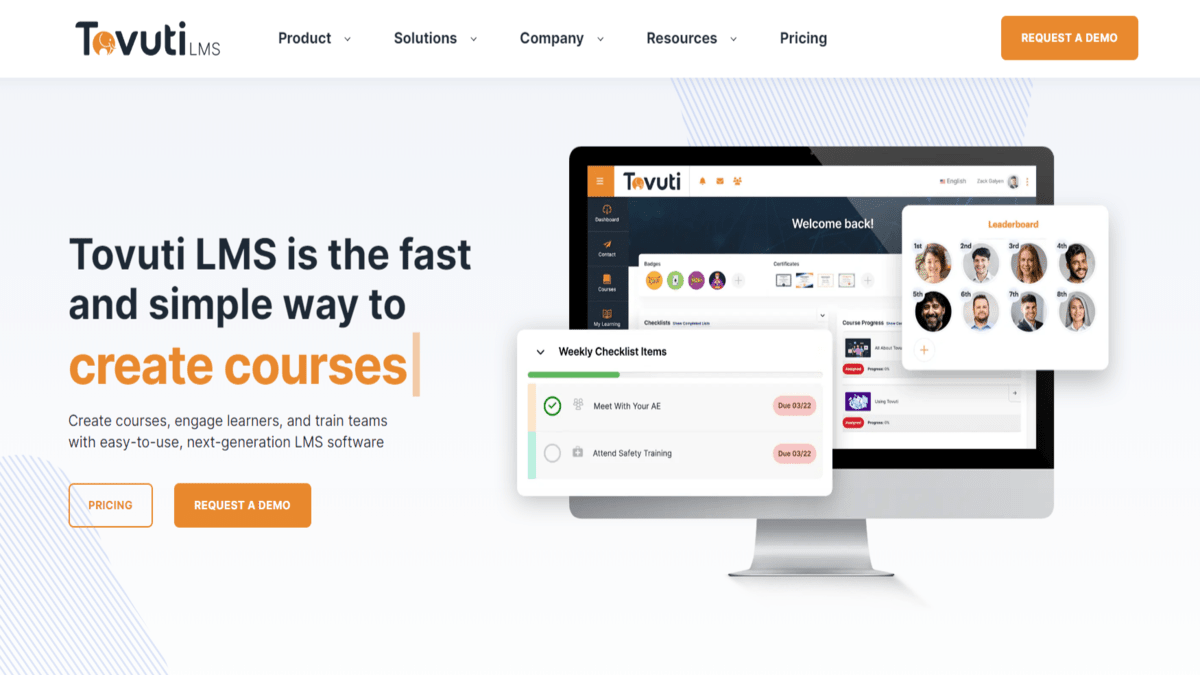
Tovuti LMS is a cloud-based learning management system designed to provide comprehensive online training solutions. It offers features for course creation, content management, assessment, and learner engagement. Tovuti is known for its user-friendly interface, customization options, and integration capabilities with various business tools. It supports blended learning approaches and provides analytics to track learner progress and training effectiveness. Tovuti LMS aims to empower organizations to deliver effective and engaging learning experiences to their employees or learners.
Key Features
- MobileCompatibility: Support for mobile devices to enable learning on the go and flexibility in training delivery.
- Analytics and Reporting: Comprehensive analytics and reporting capabilities to track learner performance, course effectiveness, and compliance metrics.
- Course Creation and Management: Tools for creating and managing online courses with multimedia content, quizzes, and assessments.
Pricing Details:
Tovuti Lms:See Tovuti LMS Pricing Details (Custom Pricing)
Example
Tovuti LMS to create courses that cover topics such as HIPAA regulations, infection control protocols, clinical procedures, and patient safety practices.
9. Medbridge LMS
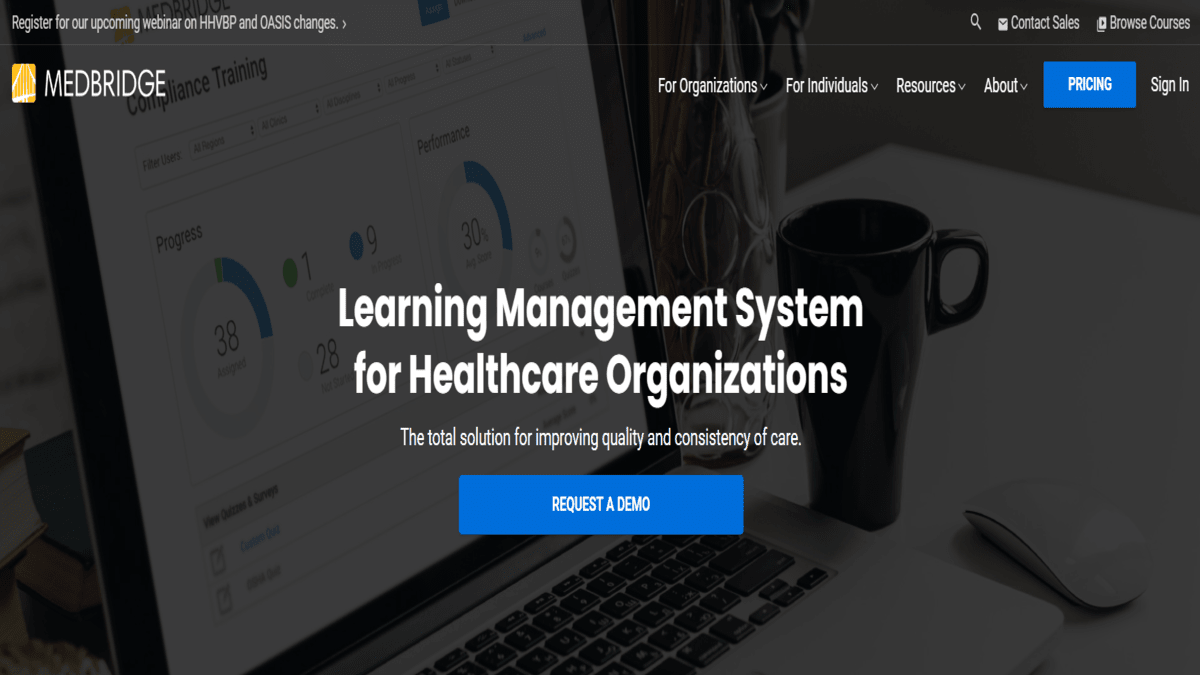
MedBridge LMS (Learning Management System) is a platform designed primarily for healthcare professionals, offering a comprehensive suite of online education and patient engagement solutions. It’s known for providing continuing education courses, clinical education resources, and compliance training across various disciplines within healthcare. The platform aims to enhance clinical competency, improve patient outcomes, and streamline educational processes for healthcare organizations.
Key Features
- Clinical Education Resources: MedBridge LMS offers evidence-based clinical education through videos, articles, and assessments to enhance skills and knowledge.
- Performance Metrics: Tools to evaluate and improve employee performance.
- Continuing Education Course: MedBridge LMS provides accredited courses across disciplines for healthcare professionals to maintain licensure and certifications.
Pricing Details:
MedBridge: See Medbridge Pricing Details
Example
A hospital uses MedBridge LMS to train nurses and therapists in wound care management through interactive videos and assessments, helping them maintain certifications and improve patient care.
10. eFront
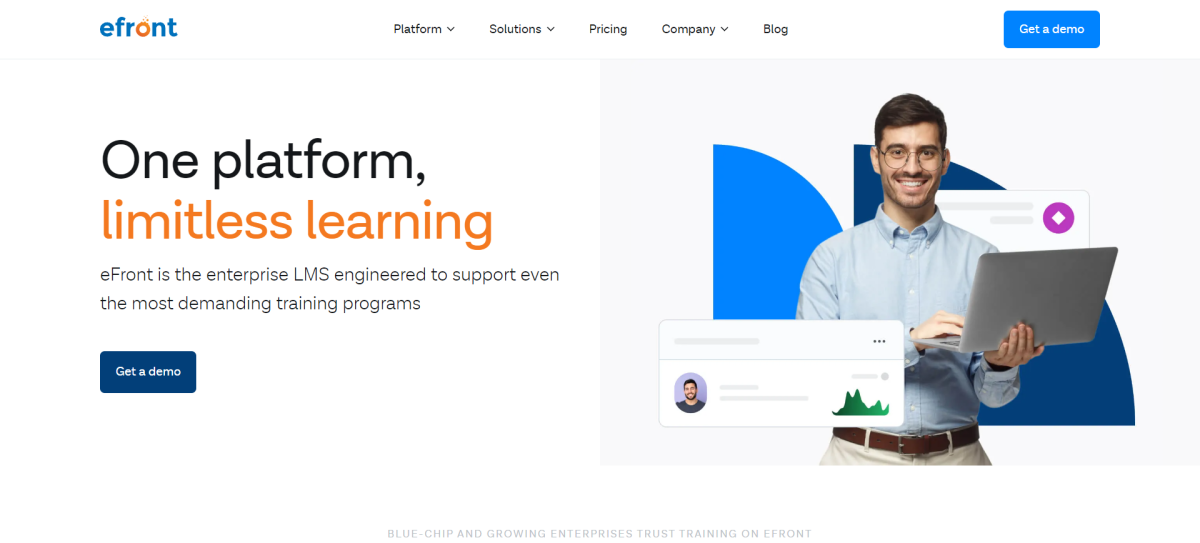
EFront LMS is a learning management system (LMS) designed primarily for corporate training and educational institutions. It provides a platform for creating, managing, and delivering online courses and training programs. EFront LMS is known for its flexibility, customization options, and robust features that cater to the specific needs of businesses and educational organizations alike.
Key Features
- Security: Strong security features safeguard sensitive data.
- Customizability: Highly customizable to meet specific needs.
- Integration Capabilities: Seamlessly integrates with other systems.
Pricing Details:
eFront LMS: See efrontlearning Pricing Details
Example
A healthcare consultancy uses eFront to provide training on data privacy and security protocols, ensuring all employees are knowledgeable about safeguarding patient information.
Choosing the right healthcare LMS software involves several key steps:

By following these steps, healthcare organizations can make an informed decision and choose an LMS that supports effective training, compliance, and overall improvement in patient care.
- Identify Needs: Determine the specific training and educational needs of your healthcare organization. Consider factors such as regulatory compliance requirements, types of training (clinical, administrative, etc.), and the number of users.
- Features and Functionality: Choose a healthcare LMS with features like compliance training, CME, credentialing support, and performance tools that fit your training goals and workflows.
- Scalability and Customization: Assess whether the LMS can scale with your organization’s growth and if it allows customization to meet specific training needs and branding requirements.
- User Experience: Check that the LMS is easy to use for admins and learners, with a mobile-friendly interface for flexible training.
- Integration: Check compatibility and integration capabilities with your existing systems (HRIS, EHR, etc.). Seamless integration can streamline data management and reporting processes.
- Support and Training: Look into the LMS vendor’s customer support for training and ongoing help to ensure smooth implementation and efficient software use.
- Security and Compliance: Verify the LMS’s security measures and compliance certifications (HIPAA, GDPR, etc.) to protect sensitive healthcare data and ensure regulatory adherence.
- Reviews and References: Read reviews from other healthcare organizations using the LMS and seek references. This provides insights into real-world performance and user satisfaction.
- Cost Considerations: Compare pricing: setup costs, licensing fees, and ongoing support expenses. Make sure the LMS fits your budget.
Conclusion
In 2024, the healthcare industry has access to a variety of powerful LMS software solutions designed to enhance training and improve patient care. These top 10 LMS tools offer features tailored to the unique needs of healthcare organizations, ensuring compliance, efficiency, and quality in training programs. By leveraging these platforms, healthcare providers can ensure their staff are well-trained and up-to-date with the latest industry standards and practices.
FAQs
1. What is an LMS software in healthcare?
Ans. An LMS (Learning Management System) software in healthcare is a platform designed to manage and deliver training and educational programs online, specifically tailored to the needs of healthcare organizations.
2. What are the key features to look for in healthcare LMS software?
Ans. Key features include compliance training modules, CME (Continuing Medical Education) capabilities, credentialing support, performance management tools, and mobile compatibility for flexible training delivery.
3. How does LMS software benefit healthcare organizations?
Ans. LMS software helps healthcare organizations by improving training efficiency, ensuring regulatory compliance, enhancing staff competency, and ultimately improving patient care outcomes.
4. What are some examples of popular LMS software for the healthcare industry?
Ans.Examples include Relias, HealthStream, Cornerstone OnDemand, SAP Litmos, and eFront, among others.
5. How can LMS software support continuous professional development in healthcare?
Ans. LMS software supports continuous professional development by offering ongoing training opportunities, tracking progress, facilitating skill development, and ensuring healthcare professionals stay updated with industry standards and best practices.
6. What should healthcare organizations consider when choosing LMS software?
Ans. Considerations include regulatory compliance requirements, types of training needed (clinical, administrative), user scalability, user interface and experience, integration capabilities with existing systems, customer support, and pricing models.
7. How can LMS software adapt to changing healthcare needs and technologies?
Ans. LMS software can adapt by incorporating new training modules, integrating with emerging technologies (like AI and virtual reality), offering mobile learning options, and providing customizable features to meet evolving healthcare demands.
8. What are the costs associated with implementing LMS software in healthcare?
Ans. Costs typically include setup fees, licensing fees based on user numbers, and ongoing maintenance or support expenses. It’s important to choose an LMS software that fits within your organization’s budgetary constraints.
9. How secure is LMS software for handling sensitive healthcare data?
Ans. LMS software vendors prioritize data security and often comply with industry standards such as HIPAA (Health Insurance Portability and Accountability Act). They use encryption, access controls, and regular audits to protect sensitive healthcare information.
10. How can healthcare organizations measure the effectiveness of LMS software?
Ans. Effectiveness can be measured through learner engagement metrics, completion rates of training programs, assessment scores, feedback from users, and overall impact on patient care quality and operational efficiency.

